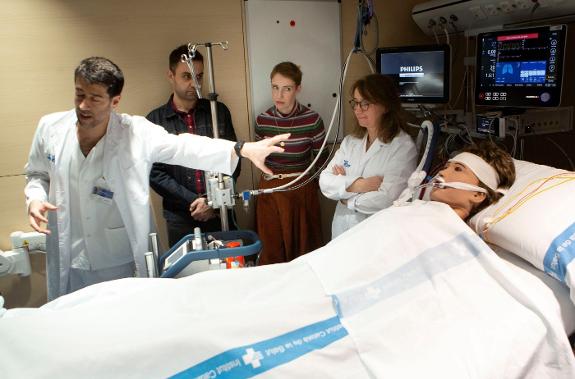

Sections
Highlight

CRISTIAN REINO
Tuesday, 7 January 2020, 15:36
Compartir
Audrey has been born again. Or, rather, she was resuscitated thanks to a pioneering revival technique. "It's a miracle," was all she could say at a press conference held recently with her doctors, to explain her experience.
On 3 November, the fire brigade announced that two hikers had been rescued from the Valle de Nuria (in Girona, in the Catalonian Pyrenees). They were named as Audrey, who is British, and Rohan, from South Africa, who live in Barcelona.
The couple had been surprised by a sudden worsening of the weather, and had got lost. The cold, the snow and the wind almost caused the death of Audrey, because when the rescue team arrived on the scene she was suffering from severe hypothermia and her body temperature was just 18 degrees. The hypothermia had caused her to lose consciousness, and her heart had stopped.
Incredibly, after six hours with no heartbeat, doctors at the Vall d'Hebron hospital in Barcelona managed to save her life. Not only that, but she has now recovered, is living almost a normal life and will be going back to work in the near future. She only needs to recover full sensitivity and movement in her hands, which were affected by the freezing cold.
Audrey doesn't remember anything about that day, but Rohan will never forget it. He said that first of all his wife began to talk incoherently as a result of the storm and the cold weather, and then she stopped moving and became unconscious. He managed to make contact with friends who lived in the area by phone, and they rang the fire brigade. A helicopter and two vehicles went to look for the couple.
Rohan had been advised by the emergency service to try to keep Audrey as warm as possible, but it was two hours after the phone call requesting assistance that the helicopter found the couple. "At first it looked as if the situation was extremely serious. They couldn't find any vital signs at all," explained Pedro Collado, a member of the fire brigade's GRAE special operations unit. They attended to her as best they could, and four hours after the phone call had been made Audrey was in a medical emergency ambulance. She was suffering from severe hypothermia and the doctors had to carry out cardio-pulmonary resuscitation techniques during the journey.
Nearly five hours after her husband thought he had lost her, Audrey arrived at the Vall d'Hebron hospital, about 140 kilometres from where the couple had been found on the mountain.
"Her heart had no electrical activity, there were no vital signs, her skin was cold. She appeared to be dead, but we knew that in the context of a hypothermia, there were possibilities of survival," explained Dr Eduard Argudo, of the Intensive Medicine service. After examining her as soon as she was brought into Emergencies, he decided the ECMO technique needed to be applied immediately. The risk was high. This was the longest case of resuscitated cardiac arrest ever registered in Spain and one of the longest in the world.
"The more I learn about this and the more I read about it, the more miraculous it seems that I survived," said Audrey at the press conference.
The technique is used on critical patients with very serious respiratory or cardiac illnesses. A machine temporarily replaces the lung or heart function. In Audrey's case, her heart had stopped. The machine removed her blood through a tube, moved it in a centrifugal pump to pass through the oxygenator, where oxygen was incorporated and carbon dioxide removed. Then the blood was put back into her body through an artery.
"This technique enabled oxygen to reach the tissues and warm up the body," said Dr Argudo. "The hypothermia was about to cause her death but at the same time, it saved her because her body, and especially her brain, did not deteriorate."
The medical experts believe that if Audrey's body temperature had been normal and she had been in cardiac arrest for so long, she would not have survived. "But we knew that as she had such severe hypothermia, there was a chance of survival with the ECMO technique," Dr Argudo explained.
When her body temperature reached 30 degrees they applied an electrical charge to try to wake her heart up and get it to beat again. They succeeded.
Publicidad
Publicidad
Publicidad
Publicidad
Reporta un error en esta noticia
Necesitas ser suscriptor para poder votar.